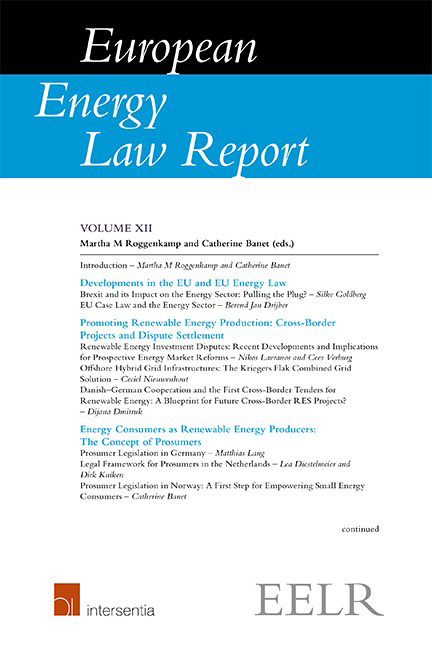Book contents
- Frontmatter
- Preface
- Contents
- List of Abbreviations
- List of Contributors
- Introduction
- PART I Developments In The EU and EU Energy Law
- PART II Promoting Renewable Energy Production: Cross-Border Projects And Dispute Settlement
- Chapter III Renewable Energy Investment Disputes: Recent Developments And Implications For Prospective Energy Market Reforms
- Chapter IV Off shore Hybrid Grid Infrastructures: The Kriegers Flak Combined Grid Solution
- Chapter V Danish-German Cooperation on the First Cross-Border Tenders for Renewable Energy: A Blueprint for Future Cross-Border RES Projects?
- PART III Energy Consumers As Renewable Energy Producers: The Concept Of Prosumers
- PART IV Balancing Renewable Electricity Production Withsupply Security: National Experiences With Capacity Mechanisms
- PART V Promoting The Use Of Sustainable Gas And Security Of Gas Supply
Chapter V - Danish-German Cooperation on the First Cross-Border Tenders for Renewable Energy: A Blueprint for Future Cross-Border RES Projects?
from PART II - Promoting Renewable Energy Production: Cross-Border Projects And Dispute Settlement
Published online by Cambridge University Press: 31 January 2019
- Frontmatter
- Preface
- Contents
- List of Abbreviations
- List of Contributors
- Introduction
- PART I Developments In The EU and EU Energy Law
- PART II Promoting Renewable Energy Production: Cross-Border Projects And Dispute Settlement
- Chapter III Renewable Energy Investment Disputes: Recent Developments And Implications For Prospective Energy Market Reforms
- Chapter IV Off shore Hybrid Grid Infrastructures: The Kriegers Flak Combined Grid Solution
- Chapter V Danish-German Cooperation on the First Cross-Border Tenders for Renewable Energy: A Blueprint for Future Cross-Border RES Projects?
- PART III Energy Consumers As Renewable Energy Producers: The Concept Of Prosumers
- PART IV Balancing Renewable Electricity Production Withsupply Security: National Experiences With Capacity Mechanisms
- PART V Promoting The Use Of Sustainable Gas And Security Of Gas Supply
Summary
INTRODUCTION
In July 2016, Denmark and Germany concluded a cooperation agreement (CA) on a pilot project allowing the realisation of the two first cross-border tenders of financial support for renewable electricity in Europe. The tenders were technology specific and related to the generation of electricity from solar photovoltaic installations (solar PV). The outcome of the pilot was surprising: solar PV projects with planned locations in Denmark secured all the winning bids in the two cross-border tenders with historical low prices for solar PV in this part of the world.
This chapter provides insight into the legal framework of this pilot cooperation, focusing on certain key elements of the CA. Based on the practical experience gained from the Danish – German cooperation, it also draws some lessons in terms of what to keep in mind when designing these kinds of crossborder projects. Finally, the chapter provides some concluding remarks and reflections for future cross-border initiatives, asking whether this cooperation could serve as a blueprint for future cross-border renewable energy projects.
A BRIEF BACKGROUND
In the spring of 2014, when the European Commission was considering the Danish applications on State aid for solar PV and wind electricity, the Commission put the legality of the Danish public service obligation (PSO) charge into question. At that time – and to a certain extent still today – financial support for electricity from renewables in Denmark was mainly financed through a PSO charge. The PSO charge is applied on all electricity bills in Denmark with the purpose of financing public support for renewable electricity.
More precisely, the Commission raised concerns as to whether the PSO charge was in compliance with Articles 30 and/or 110 of the Treaty on the Functioning of the European Union (TFEU). The concern was whether there could be a risk that the charge had a discriminatory effect on imported electricity from renewable sources and thus: ‘ If domestic electricity production is supported by aid that is financed through a charge on all electricity consumption, including consumption of imported electricity, then the method of financing, which imposes a burden on imported electricity not benefitting from this financing, risks having a discriminatory effect on imported electricity from renewable energy sources and thereby violate Articles 30 and/or 110 of the Treaty.’
- Type
- Chapter
- Information
- European Energy Law Report XII , pp. 113 - 132Publisher: IntersentiaPrint publication year: 2018



